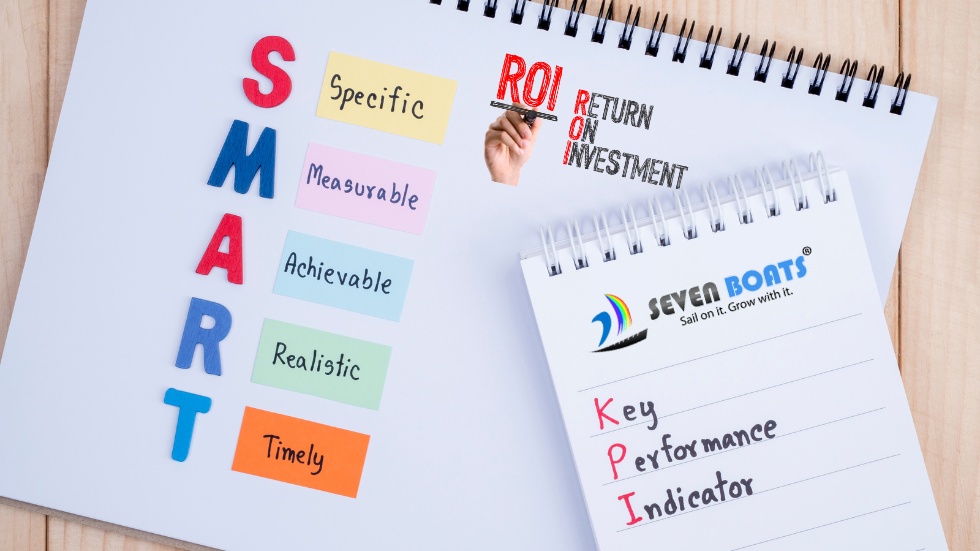Do you want to maximize ROI and KPI in your digital marketing? It’s essential that businesses have a working understanding of key metrics when it comes to online performance.
ROI, or return on investment, and KPI, or key performance indicators, are integral parts of any successful digital marketing strategy. In this article we will explore what these two terms mean and why they should be used as benchmarks for evaluating strategies.
We will discuss how each concept contributes to the overall picture of online success so that business owners can measure their investments against quantifiable results.
With this information in hand, companies can confidently invest more into their digital marketing initiatives while actively tracking the progress and making improvements along the way.
Definition
- Return on Investment (ROI): ROI is a performance measure used to evaluate the efficiency or profitability of an investment. In digital marketing, it’s calculated by dividing the return (benefit) of an investment (usually the increase in profit due to marketing activities) by the cost of the investment itself.
- Key Performance Indicators (KPIs): KPIs are measurable values that demonstrate how effectively a company is achieving its key business objectives. In digital marketing, KPIs might include metrics like website traffic, click-through rate (CTR), conversion rate, customer acquisition cost, and others.
What is ROI (Return on Investment) in Digital Marketing
ROI measures the amount of return a company receives on the investment they have made in their digital marketing efforts.
This can range from analyzing website traffic and conversion rates to social media engagement and email marketing campaigns.
By understanding the ROI of their digital marketing strategies, companies can make informed decisions about where to allocate their resources and improve their overall business performance.
After all, the ultimate goal of any investment is to see a positive return, and digital marketing is no exception.
Key Points About ROI in Digital Marketing
- Importance of ROI: ROI helps marketers understand which strategies and campaigns are working and which ones aren’t. This allows them to optimize their efforts and allocate budget more effectively.
- Calculating ROI: The basic formula for ROI is [(Net Profit / Cost of Investment) x 100]. In the context of digital marketing, net profit could be the revenue directly traceable to a campaign minus the cost of the campaign.
- Challenges of Measuring ROI: Attribution can be a challenge in digital marketing. It can be difficult to determine which marketing touchpoint led to a sale, especially when multiple channels and tactics are involved.
KPI (Key Performance Indicators): What You Need to Know
Key Performance Indicators, or KPIs, are critical to the success of any business or organization. These indicators provide valuable insights into how well a company is meeting its goals and objectives.
By measuring key metrics such as revenue, customer satisfaction, and employee productivity, KPIs can help companies identify areas where they need to improve and make informed decisions about how to allocate resources.
However, not all KPIs are created equal. It’s important to identify the most relevant and meaningful indicators for your specific business and to ensure that they are aligned with your overall strategy.
By understanding what KPIs are and what they can do for your organization, you can better track your performance, make data-driven decisions, and achieve greater success.
Related reading: Important KPIs for bloggers and content writers
Key Points About KPIs in Digital Marketing
- Choosing the Right KPIs: The right KPIs depend on your business goals. For example, if your goal is to increase brand awareness, relevant KPIs might include website traffic, page views, and social media impressions. If your goal is to boost sales, you might focus on KPIs like conversion rate and average order value.
- Common Digital Marketing KPIs: These can include website traffic, traffic source, session duration, bounce rate, conversion rate, CTR, cost per click (CPC), customer lifetime value, and social media engagement, among others.
- Using KPIs to Measure Success: Monitoring KPIs allows businesses to track progress towards their goals, make data-driven decisions, and adjust strategies as needed.
Measuring ROI & KPI in Digital Marketing
Measuring the effectiveness of your strategies is crucial to ensuring success. It’s not enough to simply deploy campaigns and hope for the best; you need to actively track and analyze data to determine ROI (return on investment) and KPI (key performance indicators).
ROI measures how much profit you are making in comparison to the amount of money you’re spending on advertising, while KPI tracks specific metrics that reflect how well your campaigns are performing.
By monitoring these factors, you’ll be able to make informed decisions about how to improve your digital marketing efforts, refine your target audience, and ultimately drive more revenue for your business.
Best Tools To Measure ROI and KPIs in Digital Marketing
Sure, here are some of the most widely used tools to measure ROI and KPIs in digital marketing:
- Google Analytics: Google Analytics is a comprehensive tool that allows you to track various KPIs like website traffic, bounce rate, session duration, and conversion rate. It also helps in tracking the ROI of your marketing campaigns.
- HubSpot: An all-in-one inbound marketing software that provides tools for social media marketing, content management, web analytics, and search engine optimization. It also offers features to track KPIs and measure ROI.
- Kissmetrics: This tool enables businesses to track, analyze, and optimize their digital marketing performance. It’s particularly good for tracking customer behavior and measuring ROI.
- Mixpanel: Mixpanel specializes in user behavior analytics. It helps businesses track user interaction with web and mobile applications and provides tools to enable targeted communication with them.
- Hootsuite: A social media management platform that allows you to schedule posts, engage with your audience, and measure the ROI of your social media campaigns.
- Salesforce Marketing Cloud: This tool provides various features for email, mobile, social, advertising, web, marketing automation, and analytics. It can help in tracking KPIs and calculating ROI across multiple marketing channels.
- SEMrush: A tool for SEO, PPC, content, social media, and competitive research. It provides a wide range of metrics and insights to improve your digital marketing strategy and measure its ROI.
Remember, the best tool for your business will depend on your specific goals, budget, and technical resources.
Advantages & Disadvantages of ROI & KPI for Digital Marketing
Tracking the Return on Investment (ROI) and Key Performance Indicators (KPIs) are essential for measuring the success of any digital marketing campaign.
On one hand, ROI gives businesses a clear understanding of how much profit their marketing efforts generate, allowing them to allocate resources accordingly.
On the other hand, KPIs provide insights into the performance of various marketing channels, such as email campaigns or social media advertising.
However, relying solely on these metrics can have its drawbacks. For instance, ROI may not accurately reflect the long-term benefits of a marketing campaign, while tracking too many KPIs can lead to data overload and a lack of focus.
Therefore, it’s crucial for businesses to strike a balance and use these metrics in conjunction with other qualitative measures to make informed decisions about their digital marketing strategies.
Top Strategies to Use Roi and Kpi for Your Business
Every business owner wants to make sure their company is on the right track. Yet, measuring success can be a tricky endeavor.
This is where key performance indicators (KPIs) and return on investment (ROI) come in handy. When strategically implemented, these metrics help track progress and ultimately boost profits.
So, what are the top strategies to use ROI and KPI for your business? It all begins with understanding your goals and selecting the right KPIs.
Then, you need to gather accurate data and analyze it in order to calculate your ROI. Finally, use this information to make informed decisions that will set you on the path to business success.
Best Practices for Increasing ROI & KPI Results in Digital Marketing
With so many different platforms available, it can be difficult to effectively track key performance indicators (KPIs) and increase return on investment (ROI).
That being said, there are certain best practices that can help ensure success. First, it’s important to define your goals and KPIs before starting any campaign.
From there, it’s crucial to continuously monitor and analyze data to make informed decisions. Utilizing a mix of paid and organic tactics can also help drive results.
Additionally, staying up-to-date on industry trends and consumer behavior can give your campaigns the edge they need to succeed.
Implementing these best practices can help take your digital marketing efforts from good to great.
Conclusion
ROI & KPI play an essential role in digital marketing, allowing businesses to measure the success of their campaigns and make improvements for both long-term and short-term goals.
Getting the most out of these metrics means understanding your goals, tracking the right metrics, identifying areas for improvement, and taking advantage of best practices in your marketing strategy.
By having clear objectives and measurable outcomes that are tracked regularly allows organizations to develop more effective campaigns that provide greater ROI & KPI results.
With proper data analysis and execution, businesses will be able to achieve desired outcomes efficiently with lower investments within the digital marketing arena.








This article is very informative.
please check our website cronbay-tech.com
this has good blog.
Thanks for letting me know about What is ROI and KPI in digital marketing
Thanks you For Sharing Informative Blog on Digital Marketing. Please visit us tamizhakarthic.com